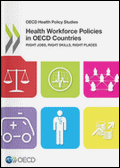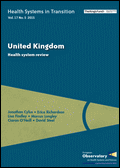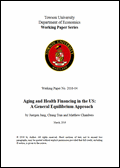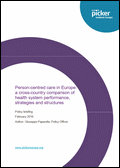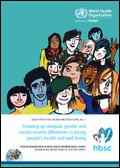 SELECTED FOR YOU... APRIL 2016
SELECTED FOR YOU... APRIL 2016
 books of the month
books of the month
 watch on health economics
watch on health economics
All the Selected for you
BOOKS
Health Workforce Policies in OECD Countries : Right Jobs, Right Skills, Right Places.
Paris : OCDE, 2016/03
Health workers are the cornerstone of health systems, playing a central role in providing health services to the population and improving health outcomes. The demand and supply of health workers have increased over time in all OECD countries, with jobs in the health and social sector accounting for more than 10% of total employment now in several OECD countries. This publication reviews key trends and policy priorities on health workforce across OECD countries, with a particular focus on doctors and nurses given the preeminent role that they have traditionally played in health service delivery.
Health system review : United Kingdom.
Observatoire Européen des Systèmes et des Politiques de Santé. Bruxelles.
Copenhague : OMS Bureau régional de l'Europe, 2015
This analysis of the United Kingdom health system reports on the national health services in the four nations of the United Kingdom (England, Northern Ireland, Scotland and Wales). With devolution of responsibility for organizing health financing and services from 1997, the four nations in the United Kingdom have diverged in the details of how services are organized and paid for, but all have maintained a national health service which provide universal access to a comprehensive package of services that are mostly free at the point of use. Although the United Kingdom spends less on health when compared to many other Western European countries, the national health services function remarkably well, showing substantial improvements in major health indicators such as amenable mortality over the past decades. Yet there remains considerable room for further improvement, with a continued gap in health outcomes between the most deprived and the most privileged populations which continues to widen, rather than close. Similar to other countries, the United Kingdom faces a number of key challenges which it needs to address to further its performance. These include those posed by an ageing population, coupled with a rising burden of chronic diseases, growing expectations and technological advances against a background of increasing financial constraints and the need to ensure that resources are spent efficiently.
Aging and Health Financing in the US: A General Equilibrium Approach.
Jung J., Tran C., Chambers M.
Towson : Towson University, 2016/03
We quantify the effects of population aging on the US healthcare system. Our analysis is based on a stochastic general equilibrium overlapping generations model of endogenous health accumulation calibrated to match pre- 2010 U.S. data. We find that population aging not only leads to large increases in medical spending but also a large shift in the relative size of public vs. private insurance. Without the Affordable Care Act (ACA), aging itself leads to a 36.6 percent increase in health expenditures by 2060. The group based health insurance (GHI) market shrinks, while the individual based health insurance (IHI) market and Medicaid expand significantly. Additional funds equivalent to roughly 4 percent of GDP are required to finance Medicare in 2060 as the elderly dependency ratio increases. The introduction of the ACA increases the fraction of insured workers to 99 percent by 2060, compared to 81 percent without the ACA. This additional increase is mainly driven by the further expansion of Medicaid and the IHI market. Interestingly, the ACA reduces aggregate health care spending by enrolling uninsured workers into Medicaid which pays lower prices for medical services. Overall, the ACA adds to the fiscal cost of population aging mainly via the Medicare and Medicaid expansion.
Person-centred care in Europe: a cross-country comparison of health system performance, strategies and structures.
Paparella G.
Oxford : Picker Institute International, 2016/02
This document provides an overview of the different approaches taken to providing quality healthcare across Europe. Looking specifically at the person centred care interpretations and strategies taken in England, Italy, Spain, Germany and the Netherlands. With the aim of advancing understanding of the ways in which different national services: have chosen to focus on the needs of their users; have adapted to address financial pressures and efficiency challenges.
Growing up unequal: gender and socioeconomic differences in young people's health and well-being.
Copenhague : OMS Bureau régional de l'Europe, 2016
Depuis trente ans, l'étude « WHO Health Behaviour in School-aged Children » (HBSC) est un outil éclairant l'élaboration des politiques de santé. Cette nouvelle édition se base sur une enquête réalisée auprès de plus de 200 000 jeunes issus de 42 pays. Elle révèle notamment que le nombre de jeunes de 15 ans ayant fumé leur première cigarette avant 13 ans a significativement baissé. De même, elle indique une diminution de la consommation d'alcool. Cette édition révèle les inégalités de genre et de niveau socio-économique qui affectent la santé et le bien-être des jeunes. Les jeunes filles ont rapporté une santé mentale moins favorable que les garçons. Elles sont plus nombreuses à penser qu'elles ont des problèmes de poids, bien que les données montrent que les garçons sont plus touchés par le surpoids et l'obésité. La majorité des jeunes déclarent avoir de bonnes relations avec leurs parents, mais la communication et le soutien diminuent avec l'âge, notamment chez les filles.
